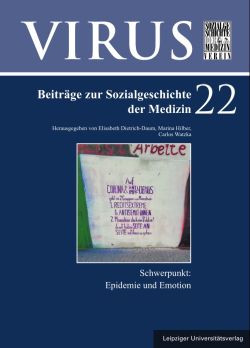|
 |
Die Zeitschrift "Virus - Beiträge zur Sozialgeschichte der Medizin" ist das Publikationsorgan des Vereins für Sozialgeschichte der Medizin und erscheint einmal jährlich.
Sie versammelt wissenschaftliche Beiträge verschiedener Disziplinen, die sich mit Themen aus den Bereichen Medizin, Gesundheit und Krankheit in historischer, kultur- und/oder sozialwissenschaftlicher Perspektive empirisch auseinandersetzen. Weitergehende Einschränkungen für Beitragsvorschläge in thematischer oder methodischer Hinsicht bestehen nicht.
Der "Virus" publiziert vornehmlich Beiträge mit Bezug zur Geschichte der Medizin in Österreich, dessen Nachbarländern sowie der ehemaligen Habsburgermonarchie. Vergleichend angelegte Arbeiten können aber über diesen Rahmen auch hinausgreifen. Hinsichtlich der behandelten Zeiträume bestehen keine Eingrenzungen, jedoch stehen Beiträge zur Medizin in der Neuzeit und der Moderne/Postmoderne im Vordergrund (16.-21. Jahrhundert).
Das aktuelle Schwerpunktheft, herausgegeben von Elisabeth Dietrich-Daum, Marina Hilber und Carlos Watzka, ist an der Schnittstelle von historischer Epidemiologie und Emotionsgeschichte angesiedelt. Die vergangene Corona-Pandemie hat uns vor Augen geführt, wie stark sich derartige gesellschaftliche Gesundheitskrisen auf sozio-kulturelle Abläufe, die Politik, Wirtschaft und auch unsere Psyche auswirken. Aus einer transdisziplinären Perspektive werden im Rahmen der präsentierten Originalarbeiten zunächst emotionale Reaktionen auf europäische Seuchenereignisse vom Hochmittelalter bis ins 20. Jahrhundert in den Blick genommen. Dabei stehen drei aufgrund ihres enormen Gefährdungspotenzials besonders gefürchtete Infektionskrankheiten im Zentrum des historischen Interesses: Pocken (Gröber, Lobenwein u. Taddei für Tirol; Watzka für die Bukowina), Cholera (Hammer-Luza für die Steiermark; Promitzer für Kärnten, Dietrich-Daum u. Heidegger für Tirol) und Influenza (Westermayer zur Russischen Grippe in Österreich-Ungarn, Behrisch u. Wehowski zur Spanischen Grippe in Breslau und Dresden). Die im Band vorgestellten Forschungs- und Projektberichte erweitern die räumliche sowie disziplinäre Perspektive auf das Thema: Von der Affektivität bei Pockenepidemien im Lateinamerika des 18. Jahrhunderts (Gabriel), über die Rolle von Emotionen im humanitären Diskurs nach dem Ersten Weltkrieg (Reichrath) sowie Musik und bildende Kunst als Techniken der Bewältigung traumatischer Epidemie-Erfahrungen (Herzfeld-Schild; Theising) bis hin zur Anwendung aktueller psychoanalytischer Forschungsstrategien (Löffler-Stastka, Stephenson u. Stephenson). Abschließend werden die Leser:innen in zehn Rezensionen über Neuerscheinungen aus dem Bereich der Sozial- und Kulturgeschichte der Medizin informiert.
|

